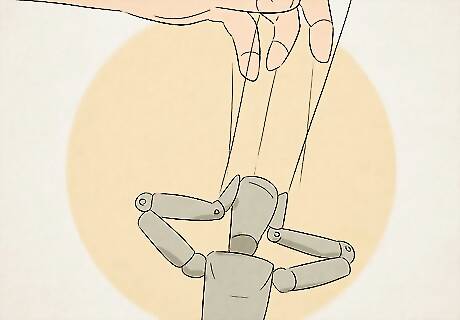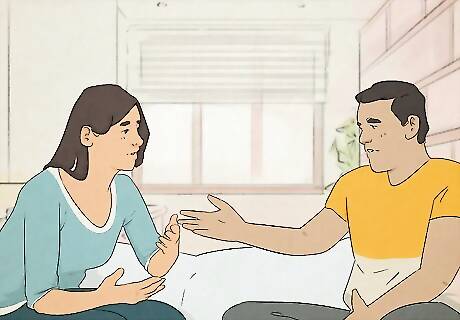
views
You might feel guilty about the affair.

There's a big emotional burden that comes with cheating. You might be aware that the other person has a family and anyone in your situation would feel conflicted. Acknowledge all the emotions you're having. You may love this person, but you could feel intense guilt about having a relationship that could break up their family. You might also resent the other person for continuing to have a relationship with their spouse. It's easy to get carried away feeling responsible for the state of their relationship, but remember, the person you're cheating with is also making a choice. It's not fair to you to shoulder all of the blame.
You may feel anger or resentment.

This is especially likely if your partner lied about being single. You may have gone into the relationship thinking the other person was free only to feel blindsided when you found out that you're the other woman. If you did know, you may start to resent the other person as time goes on—you might expect them to make a choice between the two of you. It might help your mental health to give yourself a deadline for the relationship. You can either solidify your arrangement or go your separate ways. Communicate your feelings to the other person and let them know that the relationship can't continue while you feel angry or resentful. Let them know that it's time for you to move forward with your life.
You could feel sad or depressed.

You might feel unhappy if you have to hide your relationship. Or, you might feel depressed if you imagine the relationship to be something that it's not. For instance, you might tell yourself that they'll really leave their partner for you so you can get married and start a family. If that doesn't happen, you may feel dejected. Remind yourself, that you deserve to be happy and if the affair isn't fulfilling you, it may be time to re-evaluate your relationship. You're allowed to feel sad or disappointed. Give yourself time to grieve for the relationship so you can begin to heal. If you begin feeling depressed, becoming hopeless about the future, or having trouble regulating your emotions, reach out for professional counseling. A licensed therapist can work with you to confront your emotions and move on.
You may feel isolated.

You may feel uncomfortable telling friends or family about your partner. In most cases, your partner won't involve you in their support system either. They may even cut you off from talking with friends of yours who might encourage you to leave. It's completely normal to feel incredibly lonely. Find ways to take control of your own life—don't allow your partner to arrange your plans or tell you who you can and can't talk to. If you feel comfortable, talk with close friends about what's going on. Even if they don't approve, they should be there to support you.
You might feel betrayed by your partner.

They may lie about being married or promise to leave and never do. If you think the other person is single, you may not even realize you're the other woman. It's understandable to feel duped when you find out. You might also feel betrayed if they've strung you along while telling you that they're going to leave their partner, but they don't. Be prepared to stand up for yourself if you feel like the other person is taking advantage of your trust. Usually, anxiety increases after you realize where you stand in the relationship. If you've just found out that they're using you to cheat or you realize that they're never going to leave in order to be with you, you might decide that you're better off without them.
You may feel manipulated.

Your partner might make all the decisions so you question your judgment. They might tell you that they know what's best, but really, this is manipulative behavior. The other person might even go so far as to tell you what you want. It's normal to start questioning yourself and your own decision-making. The best thing you can do is put your own emotional needs first and make yourself a priority. You might find that you won't settle for being told what to do in the relationship.
You might become distrustful.

You've seen that the other person isn't truthful to their partner. Naturally, you may ask yourself if you can truly trust them. You might even begin to distrust other relationships in your life. To fix trust issues, work on building your own self-confidence. If you haven't made time for yourself in a while, reconnect with who you are outside of the affair. You might pick up a hobby you used to love or spend time with close friends for instance. Communication is at the heart of your trust issues. Have deep conversations with the other person about why they're cheating. They should be honest and open so you can decide if you believe them. If they shut down and refuse to talk, you're probably won't be able to trust them.
You may feel confused about where the relationship is going.

The relationship can change and become more complicated. You might start feeling emotionally attached to the person or begin to question why you're seeing each other at all. You might benefit from some space, so you have a chance to consider what's best for you. If you're focusing more on the expectations of your relationship, you two need to talk about what you want. You might realize that you're having the affair for totally different reasons and it's no longer working for one of you.
You might become tired of fulfilling your partner's needs.

The person is seeing you because you're different from their partner. To them, there's something in their other relationship that's missing which is why they're cheating with you. Eventually, the pressure of meeting their needs might become too much for your relationship and you'll feel emotionally or mentally drained. For instance, you might feel like you can't truly be yourself because you're worried that's not what your partner wants. Make a point of standing up for yourself. Your job isn't to simply make the other person feel good! Ask yourself if your needs are being met. If they aren't, let them know and decide if you want to continue the relationship.
You could feel stressed out or pressured.

Studies found that the "other" person experiences clinical anxiety. Specifically, as the other woman, you might have generalized anxiety from worrying about your relationship's future. You may also have social anxiety if you're concerned about criticism or rejection. To manage your anxiety, decide if the relationship is worth the mental worry. You may realize that you're more at ease after you break things off. In the meantime, do activities that help you feel peaceful. You may journal, paint, or meditate for instance.
You may feel unsupported when the affair ends.

The affair could end with your partner going back to their spouse. In these cases, the couples usually do couples counseling to repair their marriage. Surprisingly, 90% of the "other partners" in an affair don't go on to get counseling. If you're the other woman, you might feel like you've been abandoned. Don't hesitate to get support for yourself, too. Reach out to a therapist or counselor so you can work your feelings. You can also talk with a trusted friend. It's important to find support so you can emotionally recover and move on.















Comments
0 comment